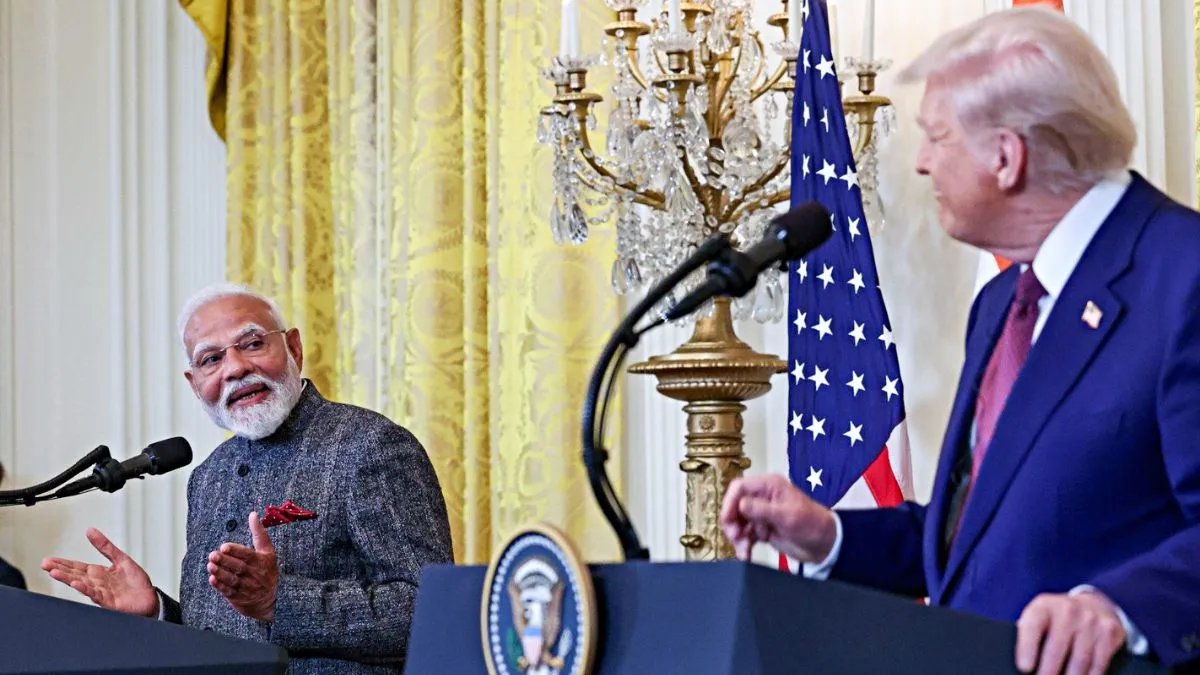- By Talibuddin Khan
- Sat, 08 Mar 2025 01:38 PM (IST)
- Source:JND
Doubling down on his attacks on India over tariffs, US President Donald Trump on Friday (local time) claimed that New Delhi has agreed to significantly reduce tariffs on American products, stating that this decision was made because "somebody's finally exposing them for what they have done." This marked the third time this week that Trump has criticised India's high tariffs. On Thursday, he called India a "very high-tariff nation" and reiterated that reciprocal tariffs would take effect on April 2.
"Our country, from an economic standpoint, financial standpoint, and trade standpoint, has been absolutely ripped off by almost every country in the world—Canada, Mexico, and then you just go right down the line. India charges us massive tariffs—massive—you can't even sell anything into India. It's almost restrictive. It is restrictive. We do very little business inside," Trump said during a briefing at the Oval Office on Friday.
"They've agreed, by the way—they want to cut their tariffs way down now because somebody's finally exposing them for what they've done. And the same thing with China, the same thing with a lot of other countries, and the EU has been a terrible abuser of this country," the US President claimed.
However, while the Indian government has not announced any decision to cut tariffs on American products, it is focusing on a mutually beneficial, multi-sector Bilateral Trade Agreement (BTA) with the US to deepen trade ties between the two countries. MEA spokesperson Randhir Jaiswal on Friday stated that the BTA aims to enhance India-US two-way trade in goods and services, increase market access, and reduce tariff and non-tariff barriers.
"The two governments are in the process of advancing discussions on a multi-sector Bilateral Trade Agreement. Through the BTA, our objective is to strengthen and deepen India-US two-way trade in the goods and services sector, increase market access, reduce tariff and non-tariff barriers, and enhance supply chain integration between the two countries," said Jaiswal.
Union Commerce and Industry Minister Piyush Goyal, who visited the US last week, also addressed concerns regarding the potential impact of proposed US import tariffs on India. He stated that comments made during election periods might not necessarily dictate future trade relations. Goyal's visit was seen as an attempt by India to persuade the Trump administration to take a favorable stance on reciprocal tariffs.
Before Trump's announcement that reciprocal tariffs would be imposed from April 2, Director General of Foreign Trade (DGFT) Santosh Kumar Sarangi noted that such plans could violate World Trade Organisation (WTO) norms. He emphasised the importance of a "wait and watch" approach to see how the situation unfolds.
"It will be very difficult to decipher from one or two sentences that Trump makes, but if I understood correctly, his main intent is that reciprocity will matter in the future. So, if you are putting a tax on Harley-Davidson (bikes), we will also put a tax on your motorbike exports," Sarangi said in December, as quoted by PTI.
ALSO READ: 82-Year-Old Woman Hospitalised After Falling At Delhi Airport, Was Denied Wheelchair By Airlines
"So from that point of view, this would clearly violate WTO (World Trade Organisation) norms. However, there have been instances when Trump has used measures like Section 232 of the Tariff Act, which allows the US to take unilateral action against countries on national security grounds. So, one will have to wait and watch," he added.
Sarangi further noted that while India has tariff peaks in certain areas, these do not necessarily affect US exports. For example, India imposes high customs duties on several agricultural products, but they are not necessarily exported to the US.
"So, if the US uses reciprocity and imposes taxes on those, it will not significantly harm us. However, there could be a few items where this reciprocal principle might have an impact," he said.
(With Agency Inputs)


